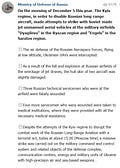How one might judge the importance of a 'battle'
Reflections on the Ukrainian attacks on Russian airfields
Just thought it might be interesting for you to understand how I, at least, tend to judge the importance or not of an engagement in a war and why I point out which events I think are important and which are not. Its arisen because of the really rather d…
Keep reading with a 7-day free trial
Subscribe to Phillips’s Newsletter to keep reading this post and get 7 days of free access to the full post archives.

